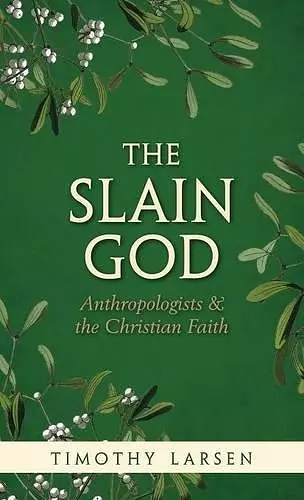The Slain God
Anthropologists and the Christian Faith
Format:Hardback
Publisher:Oxford University Press
Published:28th Aug '14
Currently unavailable, and unfortunately no date known when it will be back
This hardback is available in another edition too:
- Paperback£29.49(9780198757429)

Throughout its entire history, the discipline of anthropology has been perceived as undermining, or even discrediting, Christian faith. Many of its most prominent theorists have been agnostics who assumed that ethnographic findings and theories had exposed religious beliefs to be untenable. E. B. Tylor, the founder of the discipline in Britain, lost his faith through studying anthropology. James Frazer saw the material that he presented in his highly influential work, The Golden Bough, as demonstrating that Christian thought was based on the erroneous thought patterns of 'savages.' On the other hand, some of the most eminent anthropologists have been Christians, including E. E. Evans-Pritchard, Mary Douglas, Victor Turner, and Edith Turner. Moreover, they openly presented articulate reasons for how their religious convictions cohered with their professional work. Despite being a major site of friction between faith and modern thought, the relationship between anthropology and Christianity has never before been the subject of a book-length study. In this groundbreaking work, Timothy Larsen examines the point where doubt and faith collide with anthropological theory and evidence.
This is a startling book. Many anthropologists do not realize how deeply religious many of the great anthropologists of religion have been. The Slain God raises the question of how faith shapes what the anthropologist sees, and it will change the way the reader thinks about the answer. * Tanya Luhrmann, Watkins University Professor of Anthropology, Stanford University *
Larsen's book is beautifully written and based on the most patient scrutiny of every scrap of evidence. It provides an authoritative account of some of anthropology's most influential practitioners. * David Martin, London School of Economics *
Larsen shines a bright sidelight on the history of social anthropology and of it treatment of Christianity * Jonathan Benthall, The Times Literary Supplement *
Larsen tells the story beautifully in his narrative biographical style. * Matthew Milliner, First Things *
As in his earlier work, Larsen disrupts a teleological vision of religion condemned to disappear before the forces of progress and modernity. He is to be congratulated for challenging this narrative head-on and confronting what amounts to anti-religious bias in the human sciences. * Journal of Theological Studies *
This well-written and finely research book ... should be widely discussed in a variety of circles concerned with anthropology, religious studies, theology and the history of religion * Journal of Ecclesiastical History *
a welcome contribution to the history of anthropology ... Larsen's narrative and sharp observations skilfully weave together authors' biographical experiences with their theoretical and ethnographic findings ... I hope this book will break for good certain unspoken taboos in the discipline that one cannot be at the same time a serious anthropologist and a practising 'believer'. * Journal of the Royal Anthropological Institute *
One of the many virtues of Larsen's study is its revealing of the 'all too human' character of the scholarship by the anthropologists he examines. * Christian Smith, First Things *
Readers interested in continuing debates over faith, science and secularism will find much of value in this very important book. The further you get into the book, the more astonished you are that no predecessor has written such a full-length study of this critically important topic. * Philip Jenkins, Patheos *
Witty, penetrating, following the evidence where it leads, this book is a great delight. * John Wilson, Book of the Year 2014, Books and Culture *
Larsen has broken new ground in an area that was overgrown with the weeds of anecdote and myth. The subject has the quality of an 'elephant in the room' among both Christians and anthropologists, each of whom seem to feel that the other has nothing to offer. Quite the contrary, Larsen has demonstrated that the two are uneasy siblings, some believers and some skeptics, but siblings nonetheless. * Michael A. Rynkiewich, International Bulletin of Missionary Research *
Larsen's book is clearly and delightfully written. It is, he says, the first book-length study of the subject, and it is as welcome as it is overdue * Peter J. Leithart *
In his latest book, The Slain God , Timothy Larsen provides a compelling account of the complex relationship between anthropology and the Christian faith . . . His is the first book-length study of the relationship between anthropology and Christianity and as such is of interest to anyone who wishes to understand this relationship better. The book is also particularly timely in view of the recent resurgence of interest in these issues in the anthropology of Christianity. * Julien Dugnoille, Journal of the Anthropological Society of Oxford. *
This book will be greeted as something of a bombshell amongst anthropologists of religion...a highly original book that should be with us for a long time to come. * Joel Robbins, Sigrid Rausing Professor of Social Anthropology, Cambridge University *
Larsen provides a most satisfying study ... Beautifully written and carrying lightly an immense amount of historical and literary research well placed in the extensive footnotes to each chapter, one is impressed with the fullness of Larsens explorations ... By bringing so many strands together in a remarkably complete documentation of all sources, Larsens work stands as difficult to refute by those intoxicated with the fable that anthropology is of its nature secular, that all religion is illogical and beyond analytical remit, save to destroy it and that faith is incompatible with the good works of the discipline. * New Blackfriars *
- Winner of Books and Culture's 2014 Book of the Year.
ISBN: 9780199657872
Dimensions: 222mm x 148mm x 23mm
Weight: 460g
266 pages